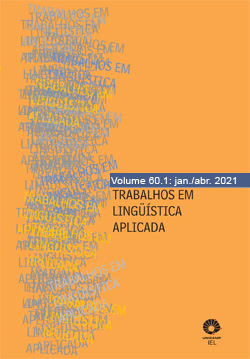Abstract
Official documents related to Law 10.639/03 provide general guidelines for its implementation in higher education institutions. However, English teacher training courses still lack specific and practical foundations to address the law content in English teaching. It means that many English teachers do not use theoretical and methodological knowledge to work on racial issues in their classes (FERREIRA, 2006). This article shows the description of contents, methodology, and theories derived from a university extension project on ethnic-racial issues and African cultures in English teaching. The project involved 9 English teachers who work in elementary and higher education in Salvador (BA) and had a course load of 45 hours. Gradually, since the group demanded, part of the classes turned to be for sharing narratives of discrimination. The event made me realize the importance of speech as a mechanism to comfort the suffering, in addition to being a fundamental input for teachers recreating their social identity of race. Thus, we set a time for the healing storytelling as a methodologically necessary part of this training. The experience not only offered a theoretical basis for teachers to address social, historical, and cultural issues related to blacks but also sharpened their perception of the daily events of racism that they had already seen, heard, or experienced inside and outside the classroom. Teacher's social identity of race seems to be decisive for them to understand ethnic-racial issues and taking a position on these themes.
References
ALMEIDA, S. (2019). Racismo Estrutural. São Paulo: Editora Pólen.
BENTO, M. A. S. (2002). Branqueamento e branquitude no Brasil. In: CARONE, I.; BENTO, M. A. S. (Org.). Psicologia social do racismo: estudos sobre branquitude e branqueamento no Brasil. Petrópolis: Vozes.
BRASIL, M. E. (2003). Lei n.° 10639, de 09 de janeiro de 2003. Altera a Lei no 9.394, de 20 de dezembro de 1996, que estabelece as diretrizes e bases da educação nacional, para incluir no currículo oficial da Rede de Ensino a obrigatoriedade da temática "História e Cultura Afro-Brasileira", e dá outras providências. Diário Oficial [da] República Federativa do Brasil. Brasília, DF. 9 jan. 2003 Disponível em:
gov.br/ccivil_03/Leis/2003/L10.639.htm > Acesso em: 30 set. 2020.
BRASIL, M.E. (2004). Parecer do Conselho Nacional de Educação n.º 3 (CNE03/2004). Dispõe sobre as Diretrizes Curriculares Nacionais para a Educação das Relações Étnico-raciais e para o Ensino de História e Cultura Afro-Brasileira e Africana. 10 mar. 2004 Disponível em: < http://portal.mec.gov.br/dmdocuments/cnecp_003.pdf> Acesso em: 10 Out. 2020.
BRASIL, M. E. (2004). Resolução n.º 1, de 17 de junho de 2004. Institui Diretrizes Curriculares Nacionais para a Educação das Relações Étnico-raciais e para o Ensino de História e Cultura Afro-Brasileira e Africana. 17 Jun. 2004 Disponível em: http://portal.mec.gov.br/cne/arquivos/pdf/res012004.pdf Acesso em: 10 Out. 2020.
CARDOSO, L. Branquitude acrítica e crítica: supremacia racial e o branco anti-racista. 1 Jun. 2010. Disponível em: < art.LourencoCardoso.pdf (clacso.edu.ar) > Acesso em: 5 Dez. 2020.
CARR, W.; KEMMIS, S. (1998). Teoria crítica de la enseñanza. Barcelona: Martins Roca.
CRENSHAW. K. (1991). Mapping the Margins: intersectionality, identity politics, and violence against Women of Color, 11 Jul. 1991. Disponível em : <https://www.racialequit ytools.org/resourcefiles/mapping-margins.pdf> Acesso em: 15 Out. 2020.
D’ADESKY, J. (2005). Pluralismo étnico e multiculturalismo: racismo e antirracismos no Brasil. Rio de Janeiro: Pallas.
ELLIOT, J. (1989). Educational theory and the professional learning of teachers: an overview. Cambridge journal of education v.19, n.1, p.82-101.
FANON, F. (2008). Pele negra, máscaras brancas. Salvador: EDUFBA
FREIRE, P. (1996). Pedagogia da autonomia: saberes necessários à prática educativa. São Paulo: Paz e Terra.
GILROY, Paul. (2001). O Atlântico negro: modernidade e dupla consciência. São Paulo: Ed.43.
GRIMMETT, P. (1998). Introduction. In: GRIMMETT, P.P.; ERICKSON, G.L. (Org.) Reflection in teacher education. New York: Teachers College Press.
RAJAGOPALAN, K. (2003). Por uma linguística crítica: linguagem, identidade e a questão ética. São Paulo: Parábola Editorial.
FERREIRA, A. J. (2006) Formação de professores Raça/etnia: reflexões e sugestões de materiais de ensino. Cascavel: Coluna do Saber.
FERREIRA, A. J. (2015). Letramento racial crítico através de narrativas autobiográficas: com atividades reflexivas. Ponta Grossa: Estúdio Texto.
FERREIRA, R. F. (2004). Afro descendente: identidade em construção, São Paulo: EDUC; Rio de Janeiro: Pallas.
hooks, b. Teaching critical thinking: practical wisdom. New York/London: Routledge, 2010.
LADSON-BILLINGS, G. (2006). Race and TESOL: introduction to concepts and theory. Cambridge University Press, p.471-489.
LADSON-BILLINGS, G. (2009). Just what is critical race theory and what’s it doing in a nice field like education? In: TAYLOR, Ed.; LADSON-BILLINGS, G.; GILLBORN, D. Foundations of Critical Race Theory in Education. New York: Routledge, p.17-36.
MOITA LOPES, L. P. (1996) Oficina de linguística aplicada: a natureza social e educacional dos processos de ensino e aprendizagem. Campinas, SP: Mercado de Letras,
PENNYCOOK, A. (1994). The Cultural Politics of English as an International Language. London: Longman.
RAJAGOPALAN, K. (2003). Por uma linguística crítica: linguagem, identidade e a questão ética. São Paulo: Parábola Editorial.
SILVA, A. C. (2001). Desconstruindo a discriminação do negro no livro didático. Salvador: EDUFBA.
SOLORZANO, D. G.; YOSSO T. J. (2005). Critical Race Methodology: counter-storytelling as analytical framework for educational research. In: In: TAYLOR, E.; LADSON-BILLINGS, G.; GILLBORN, D. (Ed.) Foundations of Critical Race Theory in Education. New York: Routledge, p.131-147.
THIOLLENT, M. (19b6). Metodologia da pesquisa-ação. São Paulo: Cortez: Autores Associados.
TRIPP, D. (2005). Pesquisa-ação: uma introdução metodológica. Educação e Pesquisa, São Paulo, v. 31, n.3, p. 443-466.

This work is licensed under a Creative Commons Attribution 4.0 International License.
Copyright (c) 2021 Trabalhos em Linguística Aplicada


